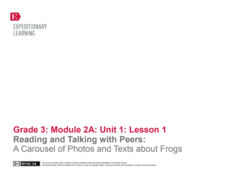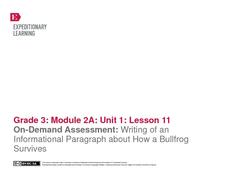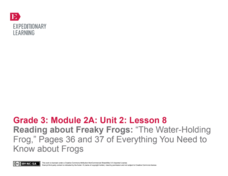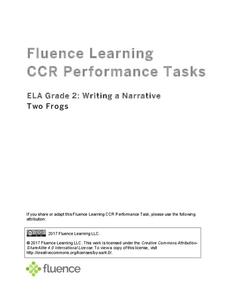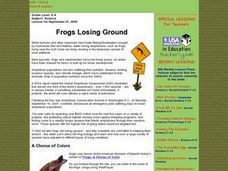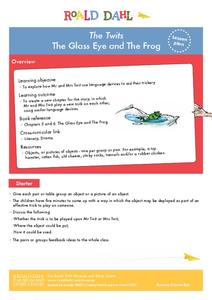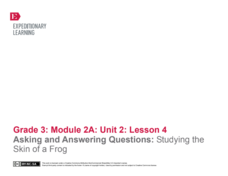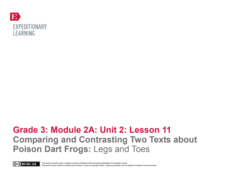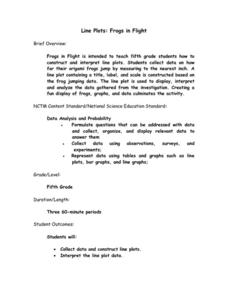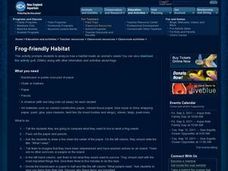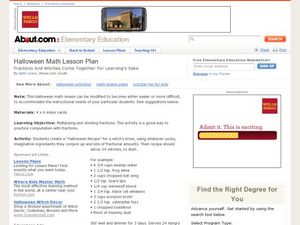EngageNY
Reading and Talking with Peers: A Carousel of Photos and Texts about Frogs
Frogs are the theme of a lesson plan that challenges scholars to examine photographs, read informational texts, then ask and answer questions. Scholars work collaboratelively as they rotate through stations, discuss their observations,...
August House
A Tale of Two Frogs
Ribbit ribbit! Hop through a series of activities based on A Tale of Two Frogs. Kids read the Russian folktale and answer reading comprehension questions before working on phonics exercises, tracing dotting lines to make a path between...
EngageNY
On-Demand Assessment: Writing of an Information Paragraph About How a Bullfrog Survives
Having read and discussed Bullfrog at Magnolia Circle, third graders demonstrate their bullfrog expertise by writing informational paragraphs. Building on the note-taking and paragraph planning from the previous lesson plan, learners...
EngageNY
Reading about Freaky Frogs: “The Water-Holding Frog"
Boost reading comprehension skills with a lesson all about freaky frogs. A poem hooks scholars and takes them into a reading of an informational text followed by peer discussions. A three-page worksheet focuses on text features and...
EngageNY
Comparing and Contrasting Two Texts about Poison Dart Frogs: Eggs and Tadpoles
Poison Dart Frog babies are the focus of a activity that challenges scholars to compare and contrast two informational texts. Beginning with a read-aloud, followed by a discussion, readers complete a practice page that examines the main...
Houghton Mifflin Harcourt
Frog Dissection
Guide your students through the process of opening up a frog. The resource provides step-by-step instructions for dissecting a frog, as well as guiding questions to answer throughout the lab.
Fluence Learning
Writing a Narrative: Two Frogs
Three options offer young writers the opportunity to read a short story, answer questions, and write a response. A handy language arts resource focuses on reading comprehension and analyziing the story's lesson: look before you leap.
Curated OER
Frogs Losing Ground
Middle schoolers explore an exhibit through an interactive program on frogs. They can listen to the different sounds frogs make and the different types of frogs. They search for the types of frogs they find in their local area.
Curated OER
Lesson 1: Identifying Information in Nonfiction
If you are in need of a lesson on identifying information in a non-fiction text, look no further. The class learns how to use a KWL chart to identify explicit information in the book, Frogs by Gail Gibbons. They fill out the KWL chart,...
Roald Dahl
The Twits - The Glass Eye and the Frog
What do a pair of stinky socks and a toy hamster have in common? The third lesson in an 11-part unit designed to accompany The Twits by Roald Dahl uses silly objects to teach about figurative language. Zany pranks and role play make for...
EngageNY
Reading about Freaky Frogs: “The Glass Frog”
Freaky frogs are the focus of a lesson plan designed to boost reading comprehension skills using text features and asking and answering questions. Informational text and a poem supply scholars with animal-related vocabulary and facts. A...
EngageNY
Asking and Answering Questions: Studying the Skin of a Frog
English language arts and science combine in a lesson that focuses on asking and answering questions about frog skin. Discussion, a read-aloud, and partner work lead the way towards a three-page worksheet that tests learners'...
EngageNY
Comparing and Contrasting Two Texts about Poison Dart Frogs: Legs and Toes
A lesson challenges scholars to compare and contrast two readings about Poison Dart Frogs. Information presented comes from different informational texts, followed by a discussion, and the completion of a Venn diagram. A one-page...
Houghton Mifflin Harcourt
A World of Animals: English Language Development Lessons (Theme 10)
Animals are the theme of this series of English language development lessons. Scholars take part in grand conversations about woodland, jungle, and grassland animals. They also go on picture walks, read poems and high frequency words,...
National Security Agency
Line Plots: Frogs in Flight
Have a hopping good time teaching your class how to collect and graph data with this fun activity-based instructional activity series. Using the provided data taken from a frog jumping contest, children first work together creating a...
National Science Teachers Association
Hop into Action
Young scientists find out what makes amphibians such unique and interesting animals in this simple life science lesson. After looking at pictures and discussing the characteristics of amphibians, learners complete a series of three Venn...
EngageNY
End of Unit Assessment: On-Demand Informational Paragraph About How the Poison Dart Frog Survives
A final assessment marks the end of a unit that takes a close look at a variety of informational texts all about frogs. A graphic organizer aides scholars in planning an accordion paragraph using their recorder forms from previous...
Curated OER
Jumping Frogs - A Lesson on The Scientific Method
Students use origami frogs to experience the scientific method. They define different scientific terms. Also they test a hypothesis and draw conclusions from observations to go through all the steps of the scientific method.
Curated OER
Frog Dissection
Students explore the anatomy of frogs. They complete a frog dissection to complete an accompanying worksheet which includes questions, diagrams and pictures.
Curated OER
Frogs: Fact or Folklore
Students discover how frogs are adapted to their environment. They view and discuss a Discovery Channel video on frogs and the myths surrounding frogs. In small, groups they compile data on frogs from the internet to create a Frog Fact...
Curated OER
Frog and Toad Are Confusing
Third graders are introduced to the similiarties and differences between a frog and a toad. In groups, they compare and contrast them and identify distinguishing characteristics of each. They watch a video on the animals and answer...
Curated OER
Frog Friendly Habitat
Students create a frog friendly habitat. In this animal habitat instructional activity, students study what animals need to survive and then create a frog habitat from a shoe box. Students write a report about frogs and present their...
Curated OER
Halloween Math Lesson Plan
Students practice their multiplication and division by creating a Witches Brew. In this holiday math lesson, students utilize Halloween style ingredients to create a fun edible treat for themselves. Students practice their measuring...
Curated OER
LP 6--8: Xenopus laevis (frog) Development for a 7th Grade Audience
Seventh graders view lab stations with Xenopus at different stages of development. They identify the life stage of the sample, as well as the previous and next stages. Students must explain their reason for selecting the specific stage.
Other popular searches
- Math Lesson on Frogs
- Introductory Lesson on Frogs
- Lesson on Frogs Camouflage
- Writing Lesson on Frogs
- Lesson on Frogs Camuflouge


